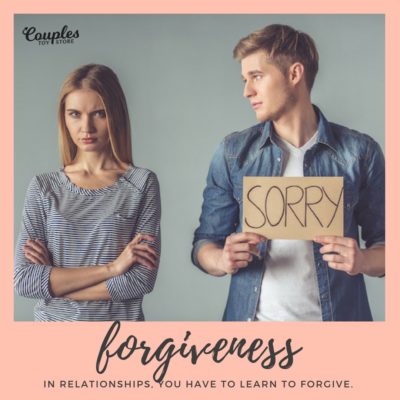Relationship Advice
Forgiveness
Forgiveness. It’s a HUGE act to do. And depending on the offense, it can require little or massive amounts of effort. In relationships, you have to learn to forgive. It’s a necessary skill for your sanity and relationship survival. There will be little offenses, and there may be big offenses. The earlier you learn how and why forgiveness healthy for YOU, the better you will be able to practice it along the way of your relationship(s).

DISCLAIMER
Before you go any further on this topic, please note: I am not saying you should forgive everyone for everything they’ve ever done wrong. Your practice of who to forgive, when, and why is completely your prerogative! My goal is to present you with information on forgiveness in general, so you can make an informed decision about who to forgive, when, and for what. As I constantly advise here on the site…you do you! I want you to have your best relationship and sex life possible and if forgiveness is a part of that, then let’s roll!BUT I DON’T WANT TO FORGIVE!
Pssh, I feel you. Forgiveness can be HARD. When someone wrongs us, particularly someone we care about and/or love, we feel a stronger sense of being wronged because we’ve become vulnerable. Our partner could tell us a white lie, ignore us when we needed them deeply, show up to a family function of yours hungover…the list of offenses that can hurt us deeply is as wide as the Mississippi River. Or bigger! And it hurts. Maybe honesty is your most important value, and when trust is broken it crushes you. Maybe you’ve dealt with rejection in relationships and that hurts more than anything. Maybe the family function had a high level of importance to you and your partner not showing up as their best self really disappointed you. Whatever the offense and your reason for being hurt – it can be hard to forgive. Gabby Bernstein recently did an interview with Lewis Howes on forgiveness and much of this content comes from her thought leadership. When asked why forgiveness is hard, she said it’s because people don’t want to do it. They hold onto resentment as a false sense of protection – thinking that being angry or resentful will protect them from it (whatever ‘it’ is) happening again. But by carrying that resentment with you, it happens every day. When you hold onto that anger, you replay and repurpose the negative experience over and over again. So instead of feeling better, you continue to feel trapped in those negative feelings.I KNOW YOU DON’T WANT TO FORGIVE, BUT HERE’S WHY YOU SHOULD
Before we answer why it’s important to forgive, let’s think about and pay homage to all the cheesy quotes about anything worth doing doesn’t come easy, you feel better after you do the hard thing, etc. Love ’em or hate ’em, many of them are true. Even though forgiveness can be difficult, it’s incredibly important. But WHY?!-
When you forgive someone, you let yourself off the hook from having to repeat the story over again and staying stuck in the negative cycle.
-
When you forgive someone, you ultimately bestow a blessing upon YOURSELF. It’s not about the wrong-doer as much as it is about you.
-
When you forgive someone, you allow release the negative feelings inside you and prevent them from manifesting in your physical being.
-
When you forgive someone, you release them from the negative stronghold you’ve placed on them.
HOW TO FORGIVE
In the interview, Gabby Bernstein reviewed her four steps for how to forgive.- Honor the anger/rage. What you feel is real. And what you feel needs to be acknowledged. Otherwise like we just discussed, you will keep it in and prolong the negativity in your mind and it will spread in your body. Feel what you feel!
- Accept that forgiveness is for YOU. When your feelings of rage and anger exist in you, they almost become like a fierce protector for you. We falsely think that will help us, but that won’t help us thrive. Gabby says we need to lay the protector down and know forgiveness is for ourselves, and not necessarily for the person who wronged us.
- Be willing to forgive. This is the #1 thing she advises on how to let go of resentment. When you even just mentally get to the place of being WILLING to forgive, the floodgates open for forgiveness to take place. Something will come through in your heart or mind that will give you the release and allow you to forgive. It all starts with being willing to forgive…and then eventually, it will happen. If you stick to “I’ll never forgive them!” then forgiveness will never be possible.
- See the light in the darkness – turn your pain into positive action. In the interview, stories of tragic acts were shared (molestation, infidelity, etc.). This last point can be taken as heavy or as light as needed based on the situation. But her message here is about what can you do moving forward, taking a negative experience and finding something positive in it? If your significant other lied to you, and you forgive him/her, maybe the silver lining is that it allowed you to have a difficult conversation about trust that brought you closer together. If someone didn’t show up to your expectation and did something wrong to you, try to see them through a lens of love. Maybe they were a catalyst for a personal growth journey for you. As much as an experience may have sucked, what did it give you? What lessons did you learn, and how did it shape you into who you are today?



